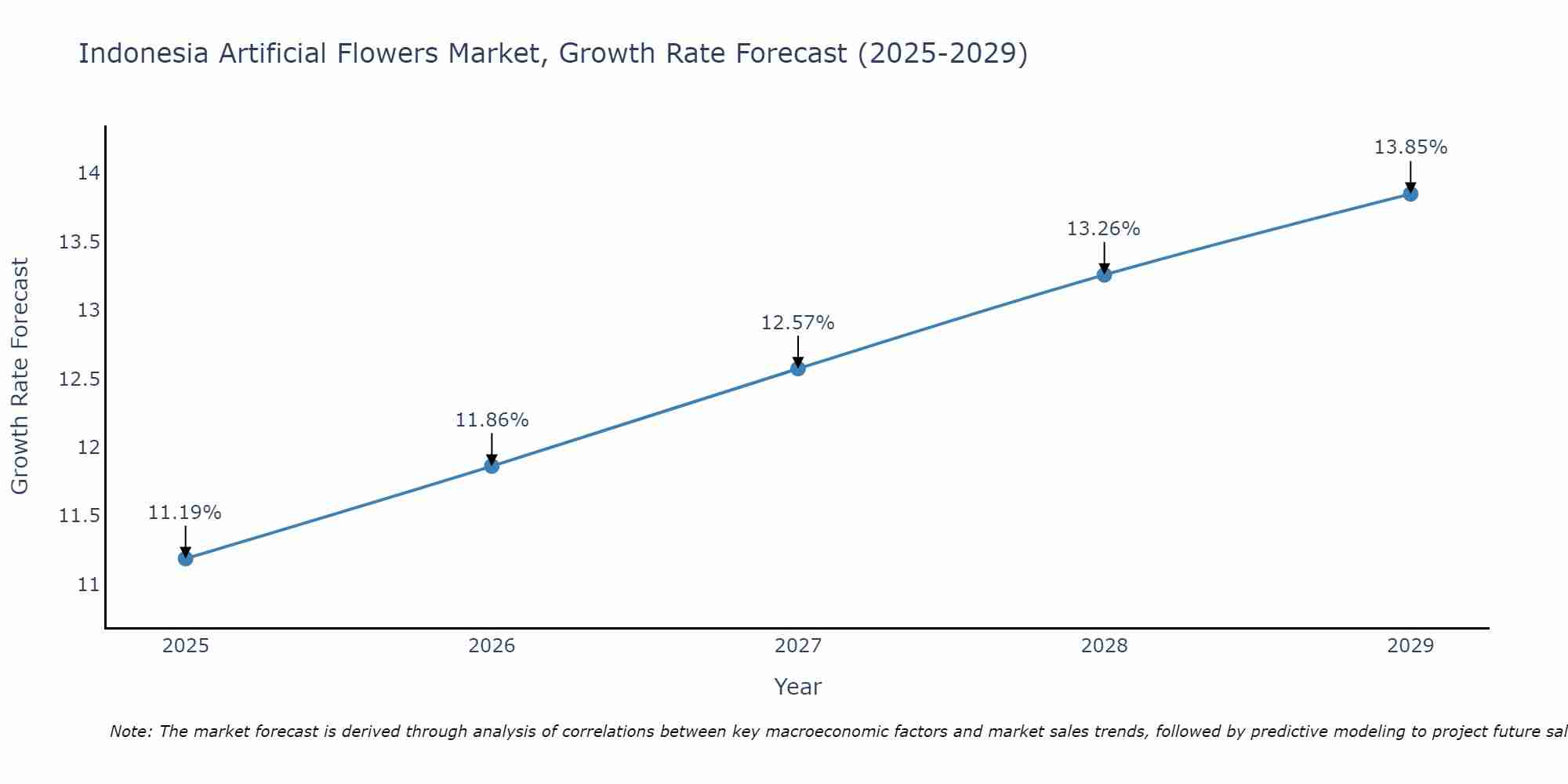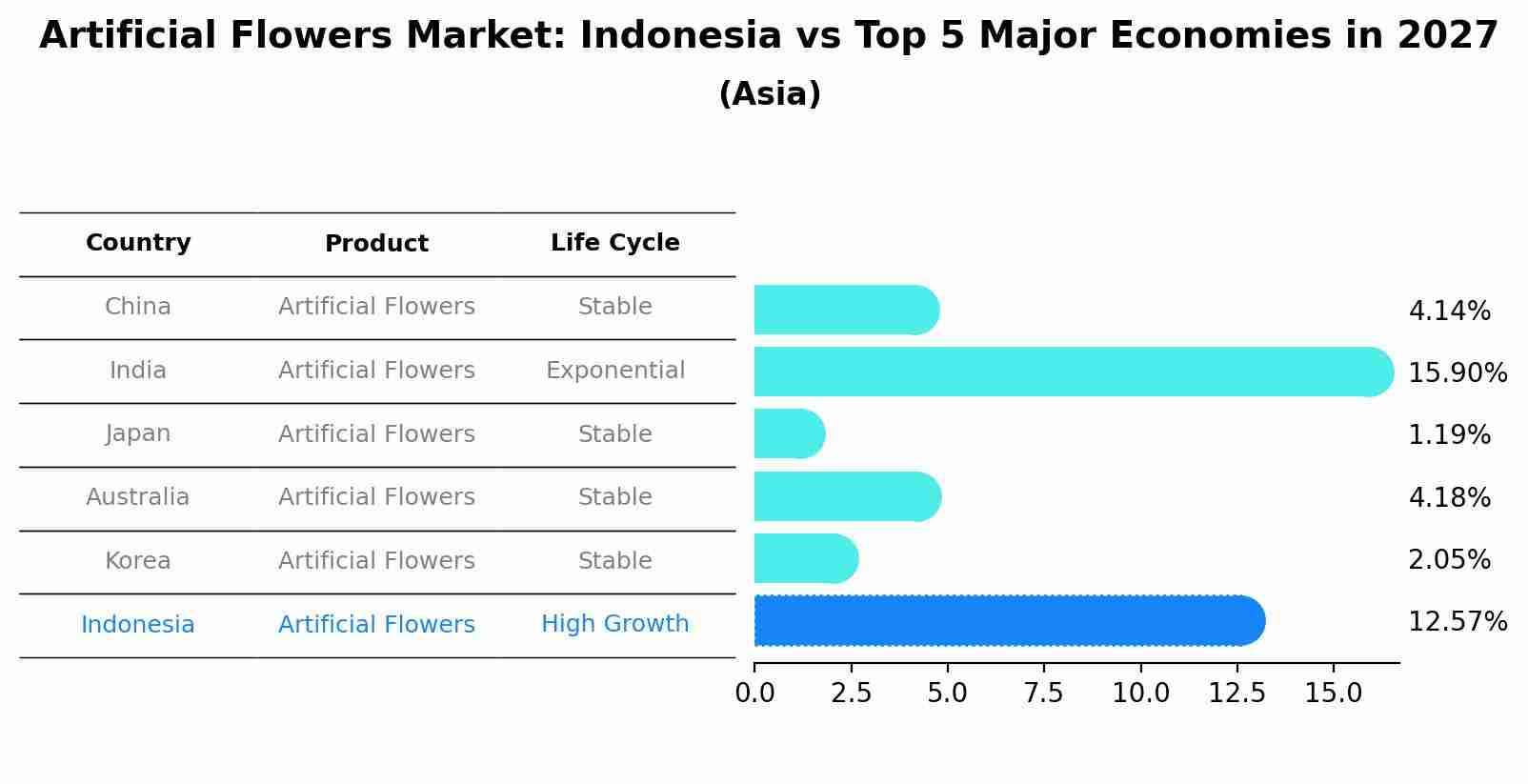Indonesia Artificial Flowers Market (2025-2031) Outlook | Size, Industry, Value, Revenue, Forecast, Companies, Trends, Share, Growth & Analysis
| Product Code: ETC380188 | Publication Date: Aug 2022 | Updated Date: Apr 2025 | Product Type: Market Research Report | |
| Publisher: 6Wresearch | Author: Ravi Bhandari | No. of Pages: 75 | No. of Figures: 35 | No. of Tables: 20 |
Indonesia Artificial Flowers Market Size Growth Rate
The Indonesia Artificial Flowers Market is poised for steady growth rate improvements from 2025 to 2029. Commencing at 11.19% in 2025, growth builds up to 13.85% by 2029.

Artificial Flowers Market: Indonesia vs Top 5 Major Economies in 2027 (Asia)
In the Asia region, the Artificial Flowers market in Indonesia is projected to expand at a high growth rate of 12.57% by 2027. The largest economy is China, followed by India, Japan, Australia and South Korea.

Indonesia Artificial Flowers Market Synopsis
The artificial flowers market in Indonesia is expanding as consumers seek cost-effective and low-maintenance decorative options for their homes and events. Artificial flowers offer long-lasting beauty without the need for regular care. This market is expected to thrive as the Indonesia population embraces these artificial alternatives for various occasions and interior decor.
Drivers of the Market
The Artificial Flowers market in Indonesia is driven by a range of factors, including changing interior design trends, urbanization, and the desire for low-maintenance decorative items. These products offer long-lasting beauty without the need for watering or maintenance. Additionally, the tourism and hospitality sectors utilize artificial flowers and plants for decorative purposes, further boosting market demand.
Challenges of the Market
The artificial flowers market in Indonesia faces competition from real flowers, which are often preferred for their natural beauty and fragrance. Creating artificial flowers that convincingly mimic real ones is a design and manufacturing challenge. Market penetration can be limited due to cultural preferences for fresh flowers in various ceremonies and traditions. Moreover, marketing and distribution issues need to be tackled to reach a wider consumer base.
COVID-19 Impact on the Market
One of the immediate and tangible effects of the COVID-19 pandemic on The artificial flowers market in Indonesia has been disruptions in the global supply chain. With lockdowns and restrictions on international trade, the importation of raw materials and finished products has been hampered. Many artificial flower manufacturers heavily rely on imported components, and delays in shipments have led to production bottlenecks and increased costs.
Key Players in the Market
The artificial flowers market in Indonesia is served by companies such as IndoFloral, ArtiBloom, and FloraCraft, offering a wide range of artificial floral products for various occasions and purposes.
Key Highlights of the Report:
- Indonesia Artificial Flowers Market Outlook
- Market Size of Indonesia Artificial Flowers Market, 2024
- Forecast of Indonesia Artificial Flowers Market, 2031
- Historical Data and Forecast of Indonesia Artificial Flowers Revenues & Volume for the Period 2021-2031
- Indonesia Artificial Flowers Market Trend Evolution
- Indonesia Artificial Flowers Market Drivers and Challenges
- Indonesia Artificial Flowers Price Trends
- Indonesia Artificial Flowers Porter's Five Forces
- Indonesia Artificial Flowers Industry Life Cycle
- Historical Data and Forecast of Indonesia Artificial Flowers Market Revenues & Volume By Material Type for the Period 2021-2031
- Historical Data and Forecast of Indonesia Artificial Flowers Market Revenues & Volume By Clay & Porcelain for the Period 2021-2031
- Historical Data and Forecast of Indonesia Artificial Flowers Market Revenues & Volume By Cotton & Silk for the Period 2021-2031
- Historical Data and Forecast of Indonesia Artificial Flowers Market Revenues & Volume By Leather & Nylon for the Period 2021-2031
- Historical Data and Forecast of Indonesia Artificial Flowers Market Revenues & Volume By Paper & Wax for the Period 2021-2031
- Historical Data and Forecast of Indonesia Artificial Flowers Market Revenues & Volume By Plastic & Polyester for the Period 2021-2031
- Historical Data and Forecast of Indonesia Artificial Flowers Market Revenues & Volume By Application for the Period 2021-2031
- Historical Data and Forecast of Indonesia Artificial Flowers Market Revenues & Volume By Commercial for the Period 2021-2031
- Historical Data and Forecast of Indonesia Artificial Flowers Market Revenues & Volume By Residential for the Period 2021-2031
- Indonesia Artificial Flowers Import Export Trade Statistics
- Market Opportunity Assessment By Material Type
- Market Opportunity Assessment By Application
- Indonesia Artificial Flowers Top Companies Market Share
- Indonesia Artificial Flowers Competitive Benchmarking By Technical and Operational Parameters
- Indonesia Artificial Flowers Company Profiles
- Indonesia Artificial Flowers Key Strategic Recommendations
Frequently Asked Questions About the Market Study (FAQs):
- Single User License$ 1,995
- Department License$ 2,400
- Site License$ 3,120
- Global License$ 3,795
Search
Thought Leadership and Analyst Meet
Our Clients
Related Reports
- Canada Oil and Gas Market (2026-2032) | Share, Segmentation, Value, Industry, Trends, Forecast, Analysis, Size & Revenue, Growth, Competitive Landscape, Outlook, Companies
- Germany Breakfast Food Market (2026-2032) | Industry, Share, Growth, Size, Companies, Value, Analysis, Revenue, Trends, Forecast & Outlook
- Australia Briquette Market (2025-2031) | Growth, Size, Revenue, Forecast, Analysis, Trends, Value, Share, Industry & Companies
- Vietnam System Integrator Market (2025-2031) | Size, Companies, Analysis, Industry, Value, Forecast, Growth, Trends, Revenue & Share
- ASEAN and Thailand Brain Health Supplements Market (2025-2031) | Strategy, Consumer Insights, Analysis, Investment Trends, Opportunities, Growth, Size, Share, Industry, Revenue, Segments, Value, Segmentation, Supply, Forecast, Restraints, Outlook, Competition, Drivers, Trends, Demand, Pricing Analysis, Competitive, Strategic Insights, Companies, Challenges
- ASEAN Bearings Market (2025-2031) | Strategy, Consumer Insights, Analysis, Investment Trends, Opportunities, Growth, Size, Share, Industry, Revenue, Segments, Value, Segmentation, Supply, Forecast, Restraints, Outlook, Competition, Drivers, Trends, Demand, Pricing Analysis, Competitive, Strategic Insights, Companies, Challenges
- Europe Flooring Market (2025-2031) | Outlook, Share, Industry, Trends, Forecast, Companies, Revenue, Size, Analysis, Growth & Value
- Saudi Arabia Manlift Market (2025-2031) | Outlook, Size, Growth, Trends, Companies, Industry, Revenue, Value, Share, Forecast & Analysis
- Uganda Excavator, Crane, and Wheel Loaders Market (2025-2031) | Strategy, Consumer Insights, Analysis, Investment Trends, Opportunities, Growth, Size, Share, Industry, Revenue, Segments, Value, Segmentation, Supply, Forecast, Restraints, Outlook, Competition, Drivers, Trends, Demand, Pricing Analysis, Competitive, Strategic Insights, Companies, Challenges
- Rwanda Excavator, Crane, and Wheel Loaders Market (2025-2031) | Strategy, Consumer Insights, Analysis, Investment Trends, Opportunities, Growth, Size, Share, Industry, Revenue, Segments, Value, Segmentation, Supply, Forecast, Restraints, Outlook, Competition, Drivers, Trends, Demand, Pricing Analysis, Competitive, Strategic Insights, Companies, Challenges
Industry Events and Analyst Meet
Whitepaper
- Middle East & Africa Commercial Security Market Click here to view more.
- Middle East & Africa Fire Safety Systems & Equipment Market Click here to view more.
- GCC Drone Market Click here to view more.
- Middle East Lighting Fixture Market Click here to view more.
- GCC Physical & Perimeter Security Market Click here to view more.
6WResearch In News
- Doha a strategic location for EV manufacturing hub: IPA Qatar
- Demand for luxury TVs surging in the GCC, says Samsung
- Empowering Growth: The Thriving Journey of Bangladesh’s Cable Industry
- Demand for luxury TVs surging in the GCC, says Samsung
- Video call with a traditional healer? Once unthinkable, it’s now common in South Africa
- Intelligent Buildings To Smooth GCC’s Path To Net Zero


















